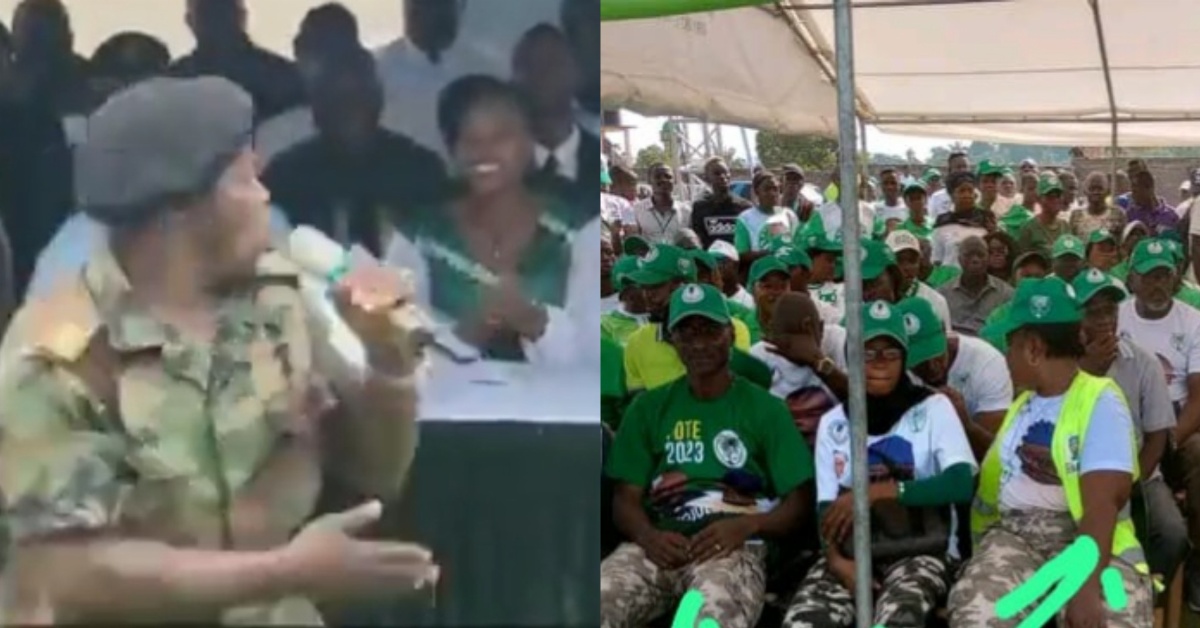As Sierra Leone prepares for its upcoming general election on 24 June 2023, a concerning trend has emerged that threatens the democratic fabric of the nation.
The increasing involvement of police officers and military personnel in political campaigns has raised alarms and stirred debates about the impartiality of security forces.
This convergence of roles jeopardizes the fundamental principles of a fair and transparent electoral process.
In this editorial, we condemn the entanglement of law enforcement and the military in political campaigns, shedding light on its implications for Sierra Leone’s democratic future. Below are some of the problems we identified with the involvement of security forces in political parties campaigns:
The erosion of impartiality:
One of the pillars of any functioning democracy is the impartiality of security forces, ensuring a level playing field for all political actors. However, the active participation of police officers and military personnel in political campaigns blurs the line between upholding the law and advancing partisan interests. When those entrusted with maintaining order become embroiled in political activities, public trust is undermined, casting doubts on the credibility of the entire electoral process.
Erosion of Public Trust
When security forces align themselves with political parties, public trust in these institutions is significantly compromised. The impartiality of the police and military is crucial to their effectiveness, and any perception of political bias erodes public confidence. This erosion is particularly concerning given Sierra Leone’s history of political instability and the efforts made to rebuild trust in the aftermath of a long and brutal civil war. Utilizing security personnel for political gain risks undoing the progress made towards a more stable and inclusive society.
Coercion and intimidation:
The presence of armed security personnel in political campaigns can have a chilling effect on free speech, stifling dissent and inhibiting fair competition. The display of guns and uniforms in a political context intimidates citizens and opposition candidates, suppressing the democratic ideals of open dialogue and peaceful exchange of ideas. By using their positions of authority to exert pressure, security forces create an atmosphere of fear, rendering the electoral playing field uneven and undemocratic.
Breach of legal boundaries:
While security forces have a legitimate role to play in maintaining law and order during elections, their involvement in partisan campaigns is a clear violation of the democratic principles that underpin Sierra Leone’s political system. Police officers and military personnel should be non-partisan guardians of public safety, working to safeguard the rights of all citizens, regardless of their political affiliation. Engaging in campaign activities blurs the line between the enforcement of law and the endorsement of specific political ideologies, eroding public trust and threatening the integrity of the electoral process.
Undermining public confidence:
When security forces are enlisted for political campaigns, it erodes public confidence in their ability to discharge their duties fairly and impartially. Citizens rely on the police and military to protect their rights and provide security, especially during elections. The involvement of these institutions in partisan activities damages their reputation, leading to a loss of trust and a sense of disillusionment among the populace. The consequences of this erosion are profound, as it weakens democratic institutions and leaves room for exploitation by unscrupulous actors.
Safeguarding democracy:
To ensure a truly free and fair election, Sierra Leone must take immediate steps to separate security forces from political campaigns. The government should enact robust legislation that explicitly prohibits the involvement of police officers and military personnel in partisan activities. Additionally, the relevant authorities must enforce strict disciplinary measures for any personnel found in breach of these regulations. Investment in training and awareness programs can also help foster a culture of professionalism and neutrality within the security forces.
A Call for Reform
To address this issue, it is necessary to enact legal and institutional reforms that explicitly prohibit the use of police officers and military personnel in political campaigns. Political parties should be required to focus their campaigns on policies, ideas, and engagement with the electorate, rather than relying on the show of force. Additionally, robust oversight mechanisms must be established to ensure compliance and to hold accountable those who violate these regulations.
Conclusion:
The entanglement of police officers and military personnel in political campaigns poses a significant threat to the democratic foundations of Sierra Leone. Preserving the integrity of the electoral process is paramount for fostering a vibrant democracy and upholding the rights and aspirations of its citizens. Sierra Leone must take decisive action to ensure that security forces remain impartial guardians of the law, divorced from partisan politics. By doing so, the nation can pave the way for a more inclusive and transparent electoral system, fostering trust and confidence among its citizens.












Is it now that you are raising concern about this? What did you say when the APC used to use the security forces to intimate SLPP in 2018 election? What about the security forces that attacked the SLPP tallay center? Please leave us alone. Ok! APC knows that there is no hope for them that is why they go on making one excuses to the other.
What is practiced everywhere in this electioneering process is security, media, and observer coverage. If a soldier or police is seen covering a campaign process, does that constitute any breach in the conduct of the security personnel? APC is remembering what has been their usual practice, which they feel others should not enjoy. “Lackla self that nor dae”
Again, the person who posted this writeup is insincere and unfair to the military as an institution in Sierra Leone. Two events, when one looks at the photo show, will clearly show a line of demarcation between the two events. This serves as a mere disservice to the people of this country; I suggest the cybercrime services probe some of these posts for appropriate action.
No cap
Fact